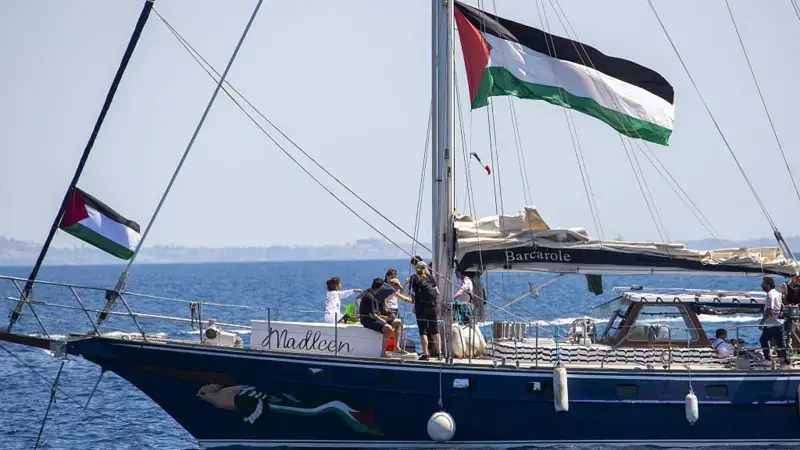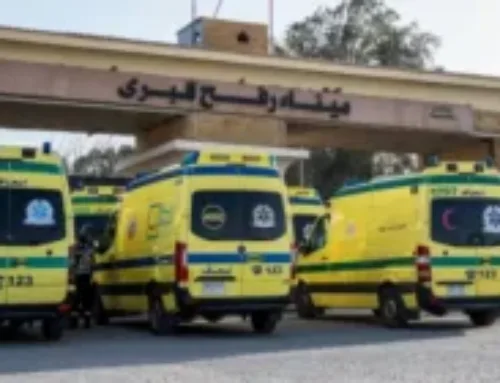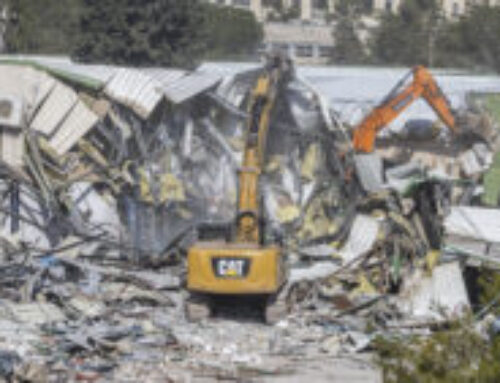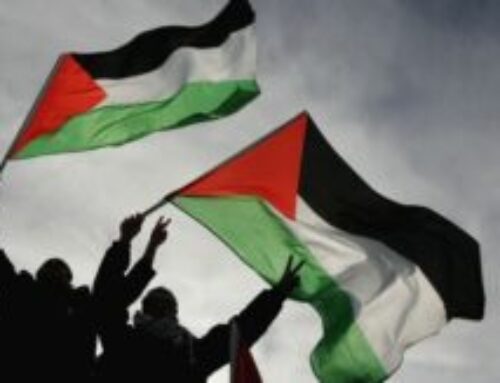At a time when many capitals turn a deaf ear to the cries of Gaza, the ship Madeliene set sail in early June 2025 from the port of Catania, Italy, heading toward the besieged strip. Onboard, it carried modest humanitarian aid — a small amount of food and medicine — but it bore something far greater: a global will to break the wall of silence surrounding the siege imposed on over two million people in Gaza.
The ship led a courageous solidarity journey, joined by twelve international activists from various nationalities, including Swedish climate activist Greta Thunberg, who declared boldly:
“I am ready to risk my life to deliver 100 kilograms of flour to Gaza.”
It wasn’t just an emotional statement; it was a profound summary of the risk now involved in merely attempting to deliver a sack of flour to a region where people are dying of hunger.
Piracy in Broad Daylight
In the early hours of June 9, 2025, nearly 100 nautical miles off the coast of Gaza, the naval forces of the Usurping Entity intercepted the Madeliene in international waters.
The operation was not only a blatant violation of international maritime law but also a political message: even a symbolic attempt to break the siege is a threat that must be crushed.
The La France Insoumise movement quickly condemned what it described as a flagrant violation of international law, affirming that intercepting the ship and arresting its crew is an illegal act that requires urgent action from the international community and the United Nations to secure the activists’ immediate release.
Yet the incident went beyond legal dimensions to expose the brutal standards imposed by the Usurping Entity on Gaza. The International Committee to Break the Gaza Siege described the event as “organized terrorism” and confirmed that the Usurping Entity is systematically committing war crimes by starving the people of Gaza and preventing aid from reaching them.
The Declared Crime of Starvation
The figures alone reveal the magnitude of the catastrophe. According to the World Food Programme, more than 116,000 tons of food are piled up at Gaza’s crossings, enough to feed one million people for four months, yet this aid is still blocked. Over 470,000 Palestinians today face catastrophic hunger (phase five of food insecurity), while more than two million people in Gaza are on the brink of full-scale famine.
The reality is even more devastating for children and women: 92% of children under two and breastfeeding mothers do not receive the minimum required nutrition. More than 71,000 children and over 17,000 mothers need immediate medical intervention to treat acute malnutrition.
International organizations such as the Red Cross and Human Rights Watch have documented that the siege imposed on Gaza for over 17 years has now reached an ethically and legally unjustifiable peak. The use of starvation as a weapon of war is not only a crime under international humanitarian law but also a deep stain on the conscience of a global community that continues to watch passively.
Madeliene is not the End of the Story
The attack on the Madeliene is not an isolated maritime incident. It is a new chapter in a long-standing siege that has persisted since 2007, where food and medicine are turned into political bargaining chips.
For Palestinians in Gaza, the ship’s interception is further confirmation that the Usurping Entity is not merely imposing a geographical blockade but a comprehensive humanitarian siege that targets daily life: fishermen are barred from the sea, farmlands wither from thirst, bakeries shut down, and children go to bed with empty stomachs.
The United Nations has repeatedly warned that the situation in Gaza exceeds the threshold of a catastrophe and affirmed that the blockade policy is causing a real famine — a crime punishable under international law.
A Call that must not be Met with Silence
The detention of the Madeliene is a fresh test of the world’s commitment to the principles it so often proclaims. Article 23 of the Fourth Hague Convention of 1907, the Geneva Conventions of 1949, and international maritime laws all guarantee the right of humanitarian aid to reach civilians, even during wars.
Today, these laws are being pushed to their limits in Gaza. The question is no longer whether what is happening is legal but whether anyone remains in the world with the will to enforce these laws.
Although Madeliene journey was forcibly cut short, it reignited the flame of solidarity and proved that the siege is not an unchangeable fate, and that the voice of conscience can pierce even the walls of starvation.
Madeliene was the spark that opened the door to other solidarity convoys that have already set sail from Tunisia and Algeria, affirming that this ship was not the end of the journey but the first gateway to the upcoming siege-breaking movements. What began as a single initiative is now transforming into a growing wave of solidarity, determined to besiege the siege itself and break down the walls of isolation, from sea to land.
The international community must stop issuing timid statements. Gaza today needs decisive actions that make a real difference. Time is running out, hunger does not wait, and the Madeliene Marked the beginning of the path.





